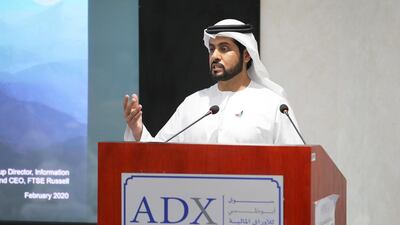The Abu Dhabi Securities Exchange expects an initial public offering and the listing of an exchange-traded fund in the second half of the year as the economy emerges from a coronavirus-induced slowdown.
Several real estate investment trusts (Reits) could also be listed on the exchange, ADX chief executive Khaleefa Al Mansouri told The National.
The IPO, however, could take place late in the year, Mr Al Mansouri said.
“We are in an active dialogue with several companies and the first one [the ETF listing] will come in August. Our target for the year [for Reit listings] was three to five Reits ... on the conservative side, I would assume two [listings],” he said.
“I expect at least one listing of a private joint stock company in the fourth quarter.”
The exchange is working closely with family offices and other private sector companies and has a strong IPO pipeline.
Listings, however, will be subject to market conditions, which he expects to improve considerably towards the end of the year and in the first quarter of 2021.
Despite movement restrictions and a slowdown caused by the pandemic, the raising of foreign ownership limits of listed companies was a boon for the exchange as it granted foreign investors access to Dh6.3 billion worth of additional stocks in the first half.
The move also helped the exchange attract more than 1,700 new retail and institutional investors.
The ADX’s overseas investor base grew by 25 per cent year on year, the exchange said in its first-half performance report released on Thursday.
“Given the obvious [Covid-19-related] challenges, our performance demonstrates that [the] ADX is delivering on its key strategic objective of becoming more liquid and more accessible to a broader mix of investors,” Mr Al Mansouri said.
Exchanges across the region are going through structural and regulatory reforms to become more accessible to a broader range of investors.
They have pushed aggressively to expand product offerings such as derivatives to bring more foreign direct investment, a central plank in the economic diversification agendas of Gulf states.
The ADX is at “an advance stage” of putting the required infrastructure in place to introduce derivative products next year, Mr Al Mansouri said.
In February, the ADX selected global index and analytics provider FTSE Russell as the benchmark administrator for its domestic equity indexes amid a push to attract more foreign investors.
Regulators have also encouraged companies to remove caps or increase foreign ownership limits to attract more liquidity to their stocks.
Four companies in Abu Dhabi raised their limits for foreign investors during the first half, including Methaq Takaful Insurance, which increased its cap from 25 per cent to 40 per cent.
Agthia, which owns the Al Ain water brand, and property developer Wahat Al Zaweya raised their limits from zero to 49 per cent.
Abu Dhabi Islamic Bank, the largest Sharia-compliant lender in the emirate, raised its limit from 25 per cent to 40 per cent.
The bourse is working closely with listed companies and Mr Al Mansouri expects “at least the same number” of companies to ease restrictions for foreign investors in the second half.
Currently, foreign investors can invest in 55 companies, or about 80 per cent of listed entities on the ADX.
“We are looking at foreign ownership limits as a journey,” he said. “It is not just the trend in the UAE, it is a global trend.”
UK investors represented the largest segment of foreign investors, trading about Dh5.2bn of shares in the first half of the year.
Those from the US and Luxembourg traded shares worth Dh4.1bn and Dh1.2bn, respectively, the ADX said.
About 1,500 new retail investors, or 87 per cent of the total, joined the exchange during the first half.
Traded value in the period stood at Dh40.7bn in the first half while total market capitalisation at the end of June fell to Dh494.6bn, down from Dh519.9bn a year ago.
“The year-on-year decrease was inevitable in view of Covid-19 and was similar to the experience of other exchanges around the world,” the ADX said.
However, the exchange’s market capitalisation received a significant boost in July after the Abu Dhabi National Energy Company merged its energy and water assets with most of Abu Dhabi Power’s portfolio companies.
The transaction added more than Dh100bn, or 20 per cent, to the ADX’s market capitalisation, which increased to Dh607bn.
The exchange, Mr Al Mansouri said, is working with all stakeholders to continue building an “increasingly international capital market”.
“We can’t predict when the world will turn the corner but there are significant grounds for optimism in Abu Dhabi and at [the] ADX,” he said.
“Our performance so far this year shows that we are as well placed, as any exchange in the world, to enable investors to take advantage of improving market conditions, by increasing access, liquidity and the range of products available.”


